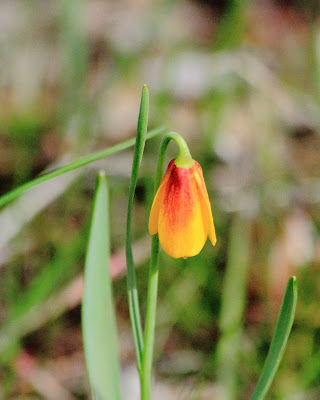The Eastern Gorge has had really nice weather on the last
two Fridays. We visited there to see what new Spring flowers have emerged
since the month began. We started at Catherine Creek, WA and then went
across the river to the Rowena Crest area in OR.
Catherine Creek
This view of the Columbia River, Memaloose Island and Rowena Gap shows
the profusion of Grass Widows in the foreground. They are at their peak now.
Yellow Bells (above) are starting to bloom. And hidden in damp rock crevices are these cute little
yellow monkey flowers.
I think they are Chickweed Monkey Flower (Mimulus alsinoides), 539 in Jolley’s book. Here is a closeup.
The flowers are about 1 centimeter across. It is always a pleasure to see the tiny red mark on their petals. And then the test is to get a decent picture.The name 'monkey-flower' comes from the grinning, ape-like faces of the flowers. The Latin mimulus means 'little actor'; it is the diminutive of mimus, meaning a buffoon or actor in a farce or mime.
I think they are Chickweed Monkey Flower (Mimulus alsinoides), 539 in Jolley’s book. Here is a closeup.
The flowers are about 1 centimeter across. It is always a pleasure to see the tiny red mark on their petals. And then the test is to get a decent picture.The name 'monkey-flower' comes from the grinning, ape-like faces of the flowers. The Latin mimulus means 'little actor'; it is the diminutive of mimus, meaning a buffoon or actor in a farce or mime.
A new flower blooming is the Naked Broomrape
(Orabanche uniflora) J-578. This plant has no leaves or chlorophyll, and lives as a parasite, attaching to the roots of Saxifrage
to obtain its nutrients.
It almost looks artificial. The common name comes from the fact that it does not have any leaves, and a British species is parasitic on Scotch Broom. Perhaps we should introduce it to our region!
It almost looks artificial. The common name comes from the fact that it does not have any leaves, and a British species is parasitic on Scotch Broom. Perhaps we should introduce it to our region!
As we drove east from the preserve, we passed the rock
outcropping at Major Creek Road. The dark rock faces
south and absorbs the sun. Each year there is a profusion of Gold Stars, Yellow
Bells, Lomatium, and Prairie Stars . This year is no exception.
Rowena Crest and Mayer State Park
Then we headed across the river at The Dalles and down to the
Mayer State Park (Exit 76 on I-84) then west on the Old Columbia Highway.
This is the beginning of the twisting stretch of road with a series of horseshoe curves, heading up to Rowena
Crest Viewpoint. The hills have patches of Garry Oak. And underneath the oaks grow Glacier Lilies, Yellow Bells, Chocolate Lilies and Toothwort.
(Ticks are also fond of this environment too, so cover-up.)
 |
| Map courtesy of Google Maps |
Today we were in luck. We spotted Oaks Toothwort immediately
(Cardamine pulcherrima) J-176.
Then the yellow Glacier Lilies (Erythronium grandiflorum), J - 24.
Yellow Bells were already maturing and turning orange.
Miner's Lettuce (Montia perfoliata) J-104 was just starting to bloom.
Notice that the flower stem appears to be piercing the leaf--hence the scientific name perfoliata. It is called miner's-lettuce because early miners and settler used it as a salad vegetable.
Then the yellow Glacier Lilies (Erythronium grandiflorum), J - 24.
Yellow Bells were already maturing and turning orange.
Miner's Lettuce (Montia perfoliata) J-104 was just starting to bloom.
Notice that the flower stem appears to be piercing the leaf--hence the scientific name perfoliata. It is called miner's-lettuce because early miners and settler used it as a salad vegetable.
A beautiful day with signs of Spring's arrival and a promise of things to come.
Copyright 2013 Tom Nelson
All Rights Reserved
Please ask before you use my photos












No comments:
Post a Comment